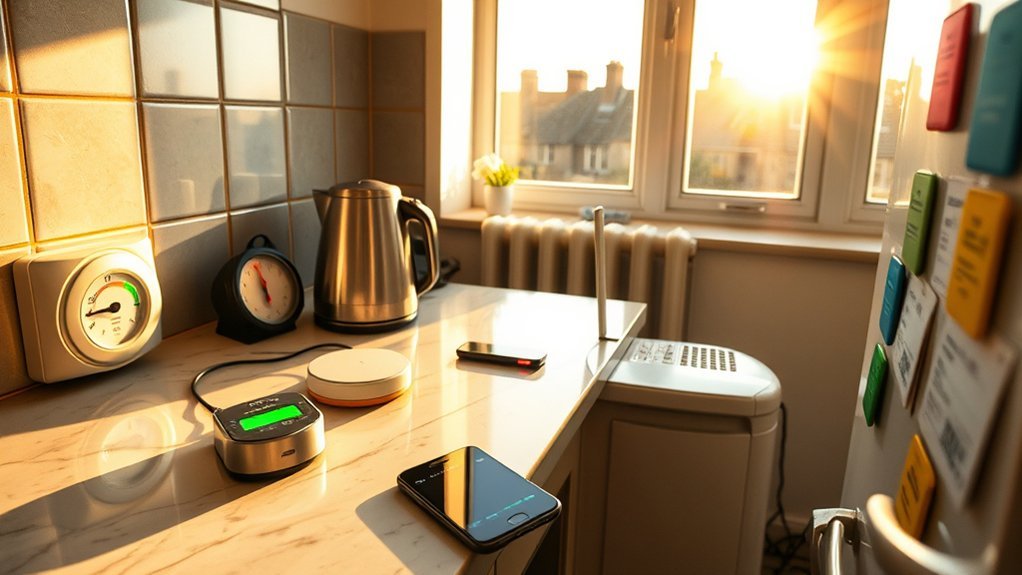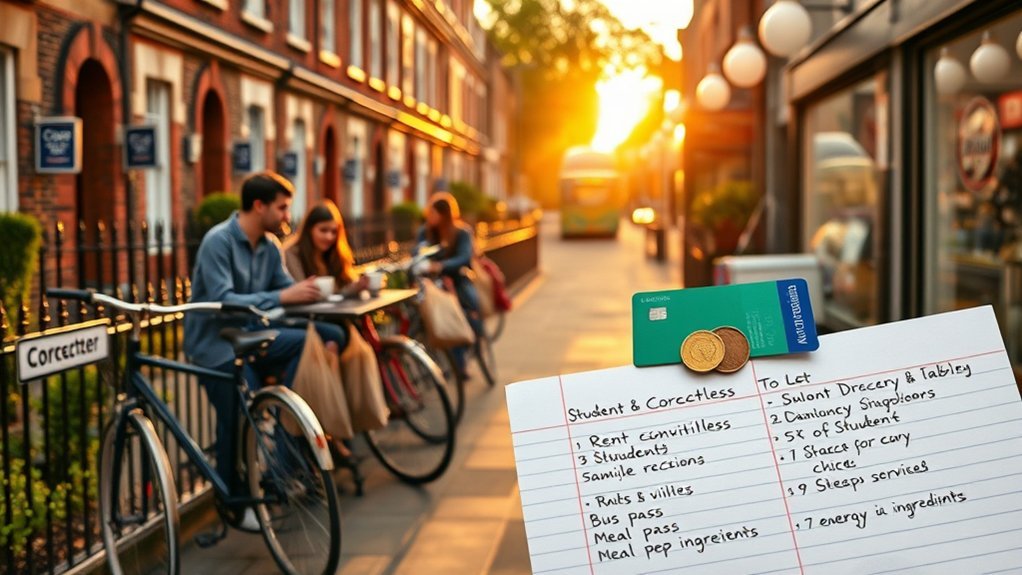You’ll typically need about £675–£800 a month for living costs in Leicester excluding rent, with a one‑bedroom city‑centre flat averaging around £750–£751 and outside‑centre about £742. Add utilities (~£220), broadband (~£32) and a transport pass (~£70) to get a fuller monthly total. Student budgets commonly land in the £1,200–£1,600 range including accommodation. Scroll on to see housing types, bills‑inclusive options and practical ways to cut costs.
About Leicester and Cost of Living Overview

Curious how far your money will go in Leicester? You’ll find the Leicester cost of living generally lower than London’s, with overall monthly expenses without rent about £675–£800 for an individual and roughly £2,610 for a family of four.
Rent in the city centre for a 1‑bed sits around £750–£751, only slightly higher than outside-centre options, so housing choices are compact and predictable.
Utilities for an 85m2 apartment typically run near £220 monthly, with internet about £31.80 and a mobile plan around £14.57, so you can forecast recurring bills accurately.
Transport is affordable: a monthly pass costs about £70 and single fares hover near £3.00, helping keep commuting costs manageable.
Compared to London, Leicester is roughly 26.5% cheaper excluding rent and shows dramatically lower rent levels, which makes budgeting simpler whether you’re assessing solo living or family needs.
Typical Monthly Budget (Excluding and Including Rent)

You’ll typically spend about £675–£800 a month on living costs excluding rent, with many comparisons putting the figure near £766. Add housing and utilities — city-centre one-bed rents around £750 and utilities roughly £220 — and your total monthly budget usually rises into the £1,400–£1,800 range depending on exact rent.
With an average net salary of about £2,050, you can quickly assess affordability and adjust choices for location and amenities.
Monthly Living Costs (Excl. Rent)
How much will you need each month in Leicester once rent’s excluded? You can expect typical monthly living costs (excl. rent) around £675–£800; a student budget is roughly £766. Breakdowns help: utilities for an 85m2 apartment run about £220, while wider housing costs including bills can reach £230–£462. Internet averages £31.80 and a mobile plan about £14.57. Compared with London’s ~£1,057.40 excluding rent, Leicester is notably cheaper. If you’re renting in the city centre—where a one‑bed is about £750.80—factor these non‑rent essentials into affordability calculations. Use these figures to build a realistic, itemised monthly plan and adjust for your lifestyle or shared‑housing savings.
Total Monthly Budget (Incl. Rent)
Want a clear picture of what you’ll actually pay each month in Leicester once rent’s included? You’ll use the Leicester cost of living data to build a practical monthly budget that combines private rents, utilities and internet, and transportation costs. Typical living costs without rent sit around £675–£800 (commonly £766); private rents for a 1‑bed are ~£750.80 city centre or £742.50 outside. Students often budget £1,200–£1,600 monthly including accommodation.
| Item | Typical | Note |
|---|---|---|
| Living costs (excl. rent) | £675–£800 | baseline |
| Rent (1‑bed) | £742–£751 | rent comparison to London |
| Utilities+internet+transport | £336 | £220+£31.80+£70 |
Use this breakdown to compare options and refine your monthly budget.
Grocery and Eating Out Prices

Curious what you’ll spend on food in Leicester? You can expect groceries to be reasonably priced: Bread (500 g) about £1.06, Eggs (12) £2.64, Milk £1.28 per litre, Rice (1 kg) £1.58 and Chicken fillets (1 kg) £6.58. Use these unit costs to build a weekly shopping list and forecast monthly costs for staples, which will help you compare against the broader £675–£800 monthly living estimate (excluding rent).
Eating out prices are also moderate: a mid-range meal for two ~£15, a McMeal ~£7, and a domestic beer ~£4.25. If you eat out twice weekly, factor that into discretionary spending; if you cook most meals, groceries dominate. Plan based on how often you dine out versus cook, and track actual receipts for a month to refine your budget. These figures give you a practical baseline for food-related monthly costs in Leicester.
Utilities, Internet and Mobile Costs

Looking at utilities, internet and mobile costs will give you a clear picture of recurring non-rent expenses in Leicester: basic utilities for an 85 m² apartment average about £220/month, a 60 Mbps unlimited broadband plan runs around £31.80/month, and mobile plans with 10GB+ data typically cost £14.57/month.
You’ll factor these into monthly costs alongside rent to form a reliable living baseline. Utilities cover electricity, heating, water and waste; expect £220 to fluctuate seasonally.
Internet at £31.80 is competitive for home use and supports remote work or streaming without extra fees. Mobile at £14.57 is affordable for standard data needs but check limits if you travel or tether frequently.
When budgeting, sum rent plus these telecom and utility figures to compare housing options and total outgoings. This concise view helps you estimate predictable recurring charges in Leicester and adjust lifestyle choices to keep monthly costs within your target.
Housing Options and Rent Examples

How much you’ll pay for housing in Leicester depends on location, property type and whether bills are included — so compare options carefully. You’ll find private housing rents range broadly (£340–£920/month), with a one-bedroom apartment around £750.80 in the city centre and about £742.50 outside. Factor utilities: a typical 85m2 apartment shows roughly £220/month, though broader figures span £230–£462.
You should weigh long-term rent against all-inclusive student accommodation and short-term stays. PBSAs and student accommodation often include utilities and can simplify budgeting; examples: The Summit studios (£155–£199) and Filbert Village en-suites/studios/1-bedroom flats (£99–£185). Compare total monthly outgoings to the non-rent average (£675–£800) and family estimates (£2,610.20 excluding rent) to see affordability.
Consider location, contract length and bills inclusion when choosing. Short-term lodging like Leicester City Apartment (~£95/night) illustrates premium nightly costs versus monthly rent.
Transportation, Leisure and Personal Care Expenses

Once you’ve picked a place to live and budgeted for rent and utilities, plan for getting around and enjoying life in Leicester. You’ll budget public transport passes at about £57–£70 monthly or £3 for a one-way ticket if you travel occasionally. Factor utilities (£220) and internet (£31.80) into monthly outgoings so transport and leisure don’t push you over your limit.
| Category | Typical monthly cost | Notes |
|---|---|---|
| Public transport passes | £57–£70 | Commuter vs occasional use |
| Utilities + internet | £251.80 | Based on 85m2 housing |
| Leisure & personal care | £25–£30 | Dinner for two ~£25, gym ~£29.83 |
For entertainment and personal care, expect a gym membership around £29.83 and casual dining ~£25 for two. Use this table to compare costs against your rent and decide whether a monthly pass or pay-as-you-go transport fits your routine.
Money-Saving Tips for Students and Residents

You can cut weekly food bills sharply by planning meals, shopping supermarket own brands, and using local markets for fruit and veg.
Look for affordable student housing by comparing university halls, private halls, and shared flats to keep rent within the £340–£920 student range.
Also use free local activities—museums, parks, and university events—to save on leisure without sacrificing your social life.
Cheap Weekly Groceries
Looking to cut your weekly food bill without sacrificing nutrition? In Leicester you can stretch groceries while keeping your monthly budget balanced—remember the average cost of living (excluding rent) runs about £675–£800, so food choices matter alongside utilities and other bills. Focus on bulk basics, seasonal produce, and supermarket own brands to lower per-meal costs.
- Buy staples in bulk: rice, pasta, lentils and frozen veg reduce unit price and waste.
- Plan meals around weekly offers and seasonal produce; compare unit prices to protect your monthly budget.
- Cook once, eat twice: batch-cook soups, stews and casseroles to save time and money, freeing cash for utilities and transport.
Affordable Student Housing
How can you cut accommodation costs without compromising comfort or study time? Start by comparing student accommodation types: PG/PSBAs often offer studios or en-suites with all-bills-inclusive pricing, like The Summit (£155–£199) or Filbert Village (£99–£185).
Contrast those with shared houses where rent prices vary widely (£340–£920) and utilities can add £388 or more to monthly bills. Prioritise affordable housing near campus to reduce travel costs and lost study time. Use a simple spreadsheet to compare total monthly outgoings—rent plus estimated utilities and groceries—against Leicester’s average non-rent living cost (£675–£800). Combine cheap weekly shopping (Aldi/Lidl) with part-time work to maintain budget living. Opting for all-bills-inclusive PBSA can simplify finances and often saves you money.
Free Local Activities
After trimming accommodation costs, it’s smart to balance savings with free local activities that keep your days full without draining your budget. You’ll reduce Leicester cost of living pressure by swapping paid outings for low-cost cultural options that fit a tight monthly budget and offset high rent prices or utilities. Free activities also support budget travel habits while you study or work.
- Visit Leicester Cathedral and the Guildhall for history-rich, no-fee exploration—great when rent pushes your monthly budget toward £1,200–£1,600.
- Spend afternoons in Abbey Park or Leicester Botanic Garden to cut entertainment spend while maintaining wellbeing amid utility costs.
- Explore the Great Central Railway Museum and timed community events that offer low-cost learning without adding to your rent or bills.
Frequently Asked Questions
What Is the Average Cost of Living in Leicester?
You’ll typically pay about £675–£800 monthly excluding rent, with rents £340–£920; plan budget housing, student nightlife, public transport, grocery budgeting, healthcare access, and safety trends into a practical, analytical monthly student or resident budget.
What Is the Average Cost of Living in the UK per Month With Rent?
You might think costs vary wildly, but you’ll typically spend £1,200–£1,800 monthly with rent; include expenses monthly, rent comparison, utility costs, transportation fare, groceries pricing, plus budgeting tips to plan precisely.
Is Leicester a Good Place to Live?
Yes — you’ll find Leicester suitable: housing and cost impact are favourable, transport’s affordable, lifestyle factors and cultural diversity excel, student life thrives, healthcare access and job market are decent, climate considerations mild, though check safety concerns and noise levels.
What Is the Average Cost of Living for a Family of 4 in the UK?
Roughly £2,500–£3,500 monthly, you’ll find average groceries, housing costs, school quality, healthcare access, transportation affordability, and entertainment options vary by region, so you’ll plan practically and adjust budgets to local realities.
Conclusion
You can live comfortably in Leicester on a range of budgets depending on your choices: shared housing and cooking at home cut costs, while private flats and frequent dining raise them. Compare rent, transport passes and groceries to spot savings, and test the theory that “small daily cuts add up” by tracking weekly expenses—chart savings to visualize progress. Plan realistically, prioritize essentials, and adjust habits to meet your financial goals without sacrificing quality of life.


